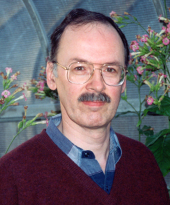Hageman Lecturer

Dr. Christopher SomervilleCarnegie Institution for Science, Department of Plant Biology October 23-24, 2002Lecture: "Genetic Dissection of Cell Wall Synthesis" Colloquium: "Plant Biology in the Functional Genomics Era & Genetic Analysis of Early Embryo Development in Arabidopsis" |
About the speaker
Christopher R. Somerville obtained a B.Sc. in mathematics at the University of Alberta, and his M.Sc. and Ph.D. in genetics from the same institution. While a postdoctoral fellow with W.L. Ogren at the University of Illinois, he characterized a number of interesting mutants of photosynthetic processes in Arabidopsis thaliana. Study of that organism has been a continuing theme of his research, and he was an early advocate of developing Arabidopsis as a model organism to become the E. coli of the plant world.
Professor Somerville was at the Michigan State University - Department of Energy laboratory for 11 years, and since 1994, he has been Director of the Carnegie Institution of Washington Department of Plant Biology and Professor of Plant Sciences at Stanford. He served four years as editor of Plant Journal and five years as associate editor of Plant Cell. He is now editor of Current Opinion in Plant Science and member of the Senior Editorial Committee of Science. Dr. Somerville has been on editorial and advisory boards of several major internationally known institutions. Among his many awards and distinctions, Dr. Somerville was recipient of the Schull Award of the ASPB in 1987, and the Gibbs Medal in 1993. He is a Fellow of the Royal Societies of London and Canada, and was elected a member of the National Academy of Sciences of the U.S. in 1996.
The majority of Chris Somerville's nearly 200 publications have Arabidopsis as the subject matter because it is the organism of choice for plant genetics. However, other plants or bacteria may prove better for engineering, or as sources of particular genes, and he has made use of these also. Many of his publications from 1985 onward deal with lipid synthesis and metabolism, but he has continued to work with mutants of photosynthetic paths, and more recently has examined mutants modified in cellulose synthesis, various developmental processes, and hormone responses. A number of his recent articles and commentaries deal with broader issues of metabolic engineering, concerns with transgenic plants, and plants as factories. A couple of obvious goals are to produce high value chemical precursors such as useful lipids, and plastic polymers such as poly-(β)-hydroxybutyrate.
Cell walls represent an especially challenging plant component to work with or understand. Cellulose synthesis occurs in a multi-subunit complex which secretes the (insoluble) polymer from the outer membrane of the cell. Certain mutations of proteins found in this complex result in resistance to herbicides that interfere with early development of plants. Phenotypes of other mutations indicate that glycosylation and glucosidase activity are essential for cell wall synthesis and plant development. Some of Dr. Somerville's recent publications have dealt with characterizing these mutants.
The main topics of Professor Somerville's presentations include recent work conducted in his laboratory that has focused on control points in plant morphogenesis and cell wall formation. He will also discuss the future of plant genomics at the colloquium session.